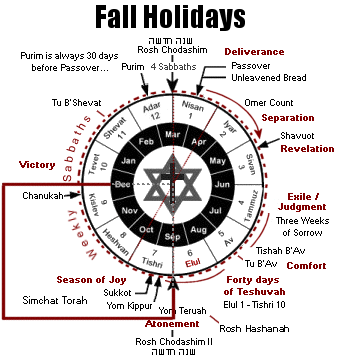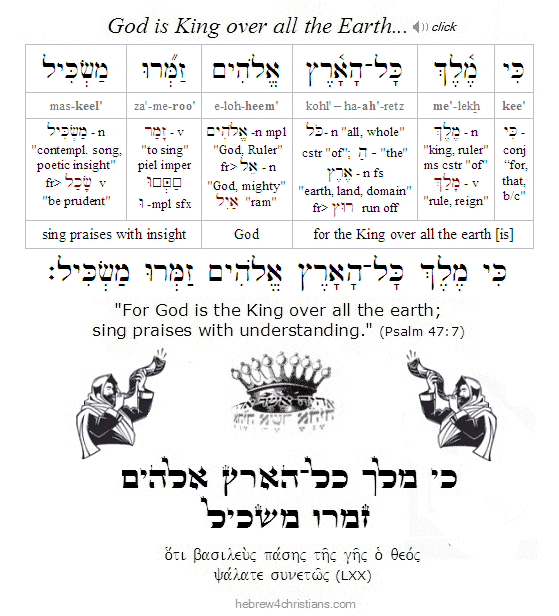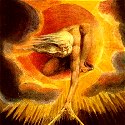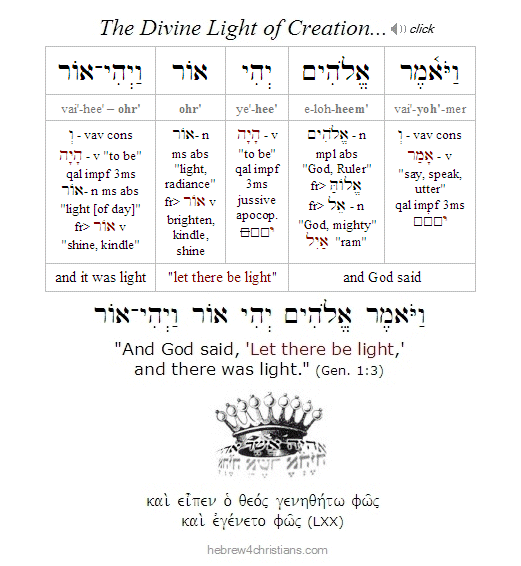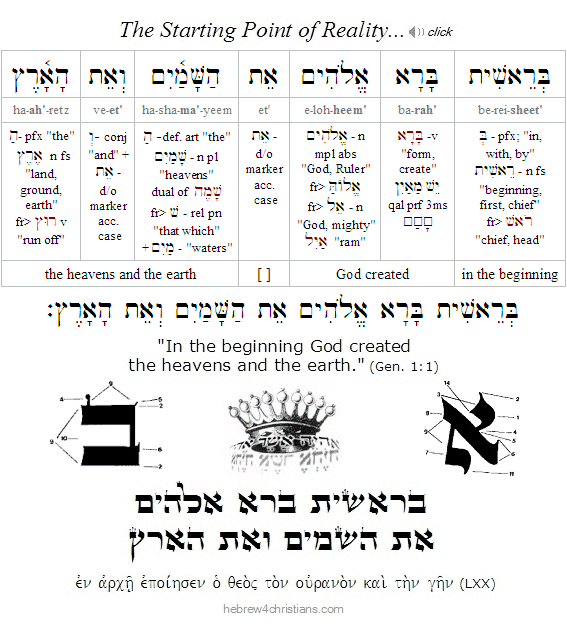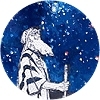|
Popular Judaism regards Rosh Hashanah as the date of the Creation of the universe by God (Talmud: Rosh Hashanah 27a), but the Midrash notes that it occurred six days earlier, on the 25th of Elul, when God created the Divine light by saying, "Let there be light" (Gen. 1:3). The sages reasoned that since the gematria for the word yehi (ūÖų░ūöų┤ūÖ), "let there be," is 25, and man was created on Rosh Hashanah, the first work of creation (ū×ųĘūóų▓ū®ūéųĄūö-ūæų╝ų░ū©ų┤ūÉū®ūüų┤ūÖū¬) actually began on Elul 25 of the Hebrew calendar...
The Mishnah (Sanhedrin 38b) states that Adam and Eve were created six days later on Rosh Hashanah (i.e., Tishri 1), but how did the sages determine this date? In other words, why did they think man was created on Rosh Hashanah? By transposing the Hebrew letters of the very first word of the Hebrew Scriptures:
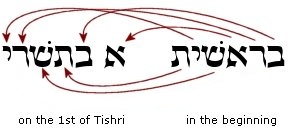 |
In other words, by rearranging the letters of the word bereshit ("in the beginning"), the phrase aleph b'Tishri ("on the 1st of Tishri") was formed, and therefore this date became associated with the anniversary of creation (or rather, the creation from Adam's perspective, i.e., the "sixth day").
According to Jewish tradition, this first "Friday" of creation was the first Rosh Hashanah, the "head of the year," since it represents the day that God began to rule as King of the Universe (i.e., melekh ha-olam: ū×ųČū£ųČūÜų░ ūöųĖūóūĢų╣ū£ųĖūØ). When Adam first opened his eyes and human consciousness was born, he immediately understood that the LORD created all things, including himself. According to midrash, Adam's first words were, ūÖūöūĢūö ū×ųČū£ųČūÜų░ ūóūĢų╣ū£ųĖūØ ūĢųĖūóųČūō / Adonai malakh olam va'ed: "The LORD is King for ever and ever" (Exod. 15:18). God then said, "Now the whole world will know that I am King," and He was very pleased. This was the "tov me'od" (ūśūĢų╣ūæ ū×ų░ūÉūō) moment of creation, when God saw all that He had made "and found it very good" (Gen. 1:31). The birthday of humanity is therefore the Coronation Day for the King of the Universe. Psalm 47 celebrates the Kingship of God that mentions the "shout" (teruah) and shofar blast of God's coronation:
ūóųĖū£ųĖūö ūÉų▒ū£ūöų┤ūÖūØ ūæų╝ų┤ū¬ų░ū©ūĢų╝ūóųĖūö
ūÖų░ūöūĢųĖūö ūæų╝ų░ū¦ūĢų╣ū£ ū®ūüūĢų╣ūżųĖū©
ah┬Ęlah E┬Ęloh┬Ęheem beet┬Ęroo┬Ęah
Adonai be┬Ękohl shoh┬Ęfahr

"God has gone up with a shout (teruah),
the LORD with the sound of a trumpet (shofar).
Psalm 47:5


The sound of the shofar is meant to awaken our consciousness that the LORD is King of the Universe. "Wake up from your (moral) sleep. You are asleep. Get up from your slumber. You are in a deep sleep. Search for your behavior. Become the best person you can. Remember God, the One Who created you" (Mishneh Torah). "How blessed are the people who know the joyful sound (teruah), O LORD; they walk in the light of Your Presence" (Psalm 89:15).
The Midrash also says that on this very first Rosh Hashanah (i.e, the day of humanity's creation) Adam and Eve committed the fatal sin by eating from the forbidden Tree of the Knowledge of Good and Evil:
They taught in the name of R' Eliezer: On the twenty-fifth day of Elul the world was created... On the day of Rosh Hashanah, during the first hour, it occurred to His thought [i.e., to create man]; in the second, He took council with the ministering angels; in the third, He gathered together his dust; in the fourth, He kneaded him; in the fifth, He shaped him; in the sixth, He completed his form; in the seventh, He breathed into him soul; in the eighth, He placed him in the Garden; in the ninth, he was commanded; in the tenth, he transgressed; in the eleventh, he was judged; and in the twelfth, he went free.
After the LORD judged Adam and Eve, He compassionately gave them the skin of a sacrificial lamb as their covering (Gen. 3:21). This First Sacrifice, offered by the Hand of God Himself, foreshadowed the coming Sacrifice of the Lamb of God who was slain "from the foundation of the world" (1 Pet. 1:20). On the very first day of mankind's creation, then, the LORD initiated His plan of redemption and salvation through Yeshua (Jesus) as the Divine Light of the world (ūÉūĢų╣ū© ūöųĖūóūĢų╣ū£ųĖūØ). For more on this, see the "Gospel in the Garden."
Midrash Bereshit includes the statement: "Great is teshuvah, for it preceded the Creation of the World, as it says, 'Before the mountains came into being, You reduced Man to nothingness, and said 'Return' (Psalm 90:2-3)." This idea suggests that God created humanity with the intent of ultimately revealing Himself as Redeemer and Savior. Therefore we see the Lamb of God (ū®ūéųĄūö ūöųĖūÉų▒ū£ūöų┤ūÖūØ) slain "from the foundation of the world" (1 Pet. 1:20) restoring the kingdom that was prepared for those chosen to be redeemed "before the foundation of the world" (Eph. 1:4, Matt. 25:34). The Book of Revelation likewise mentions the Book of Life of the Lamb that was slain (ūĪųĄūżųČū© ūŚųĘūÖų╝ųĄūÖ ūöųĘū®ų╝ūéųČūö ūöųĘūśų╝ųĖūæūĢų╝ūŚųĘ) "from the foundation of the world" (Rev. 13:8, 17:8).
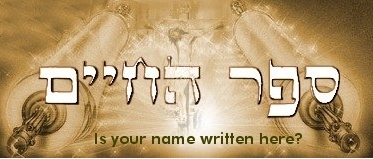 |
The Akedat Yitzchak ("Binding of Isaac") is a major theme on Rosh Hashanah. According to Jewish tradition, God told Abraham that the ram's horn (shofar) should be blown on Rosh Hashanah to remind the people of the substitutionary sacrifice provided by the LORD Himself -- an echo of the First Sacrifice offered in Eden. How much more should we as believers in the greater sacrifice of Yeshua as our Lamb of God celebrate this day?
The LORD is a God of order. The appointed times (moedim) were not given to Israel in vain. As Samson Raphael Hirsch once wrote, "The catechism of the Jew is his calendar." Round and round the calendar we go, waiting for God's revelation and will to be fulfilled in us.
|

